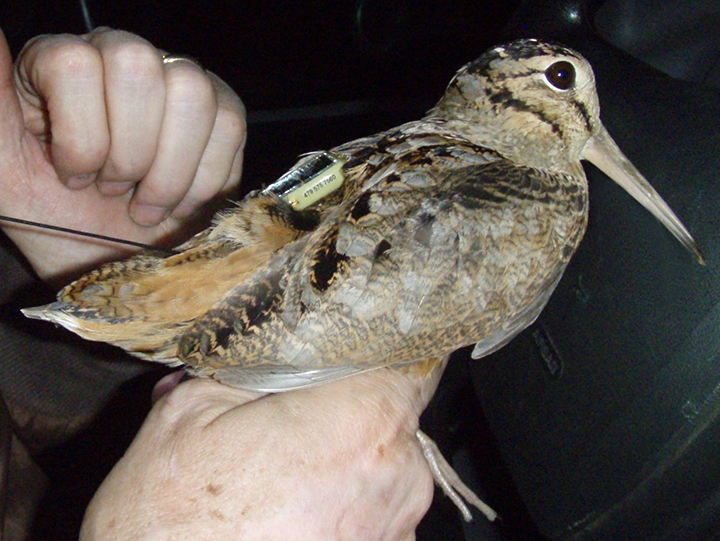
FAYETTEVILLE, Ark. — Biologists are using a federal grant to continue tracking the migration of the familiar American woodcock, a bird that is slowly disappearing across eastern North America.
The U.S. Fish and Wildlife Service has awarded nearly $50,000 to the U.S. Geological Survey Arkansas Cooperative Fish and Wildlife Research Unit, housed in the University of Arkansas Department of Biological Sciences, for a woodcock-monitoring project that began in 2013.
“We’ve seen long-term declines across the species range, at a rate of about 1 percent a year since the 1960s,” said David Krementz, a research professor of biological sciences at the U of A and leader of the fish and wildlife unit. “Understanding woodcock migration is a conservation priority because its migratory period is believed to be a period of high mortality.”
American woodcocks have been studied extensively in their breeding grounds – which include the upper Midwest, New England and Canada – and their wintering grounds in the Southeast and Gulf Coast, but there has been very little research of the woodcocks during their migratory period, Krementz said.
Joe Moore, a master’s student in biology at the U of A, will trap woodcocks this fall in their breeding and wintering grounds in the upper Midwest and this winter in their wintering grounds in Texas and Louisiana. Moore will attach specialized satellite transmitters on the birds to track their southern migration.
“We will be able to identify migration routes, regions that are important for migratory stopovers, as well as the habitat types they are using for these stopovers,” Moore said. “These data could then be used to identify priority areas to focus on habitat management and land acquisition efforts, and fine-tune hunting-season dates along the woodcocks’ migration routes.”
In a pilot project that began in the fall of 2013, researchers attached satellite transmitters to woodcocks in Minnesota, Louisiana, Arkansas and Texas.
The research team, which includes the U.S. Geological Survey Minnesota Cooperative Fish and Wildlife Research Unit and the U.S. Fish and Wildlife Service, created a website showing up-to-date locations of tagged woodcocks.
About the University of Arkansas: The University of Arkansas provides an internationally competitive education for undergraduate and graduate students in more than 200 academic programs. The university contributes new knowledge, economic development, basic and applied research, and creative activity while also providing service to academic and professional disciplines. The Carnegie Foundation classifies the University of Arkansas among only 2 percent of universities in America that have the highest level of research activity. U.S. News & World Report ranks the University of Arkansas among its top American public research universities. Founded in 1871, the University of Arkansas comprises 10 colleges and schools and maintains a low student-to-faculty ratio that promotes personal attention and close mentoring.
Topics
Contacts
David Krementz, research professor, Department of Biological Sciences
J. William Fulbright College of Arts and Sciences
479-575-7560,
Chris Branam, research communications writer/editor
University Relations
479-575-4737,